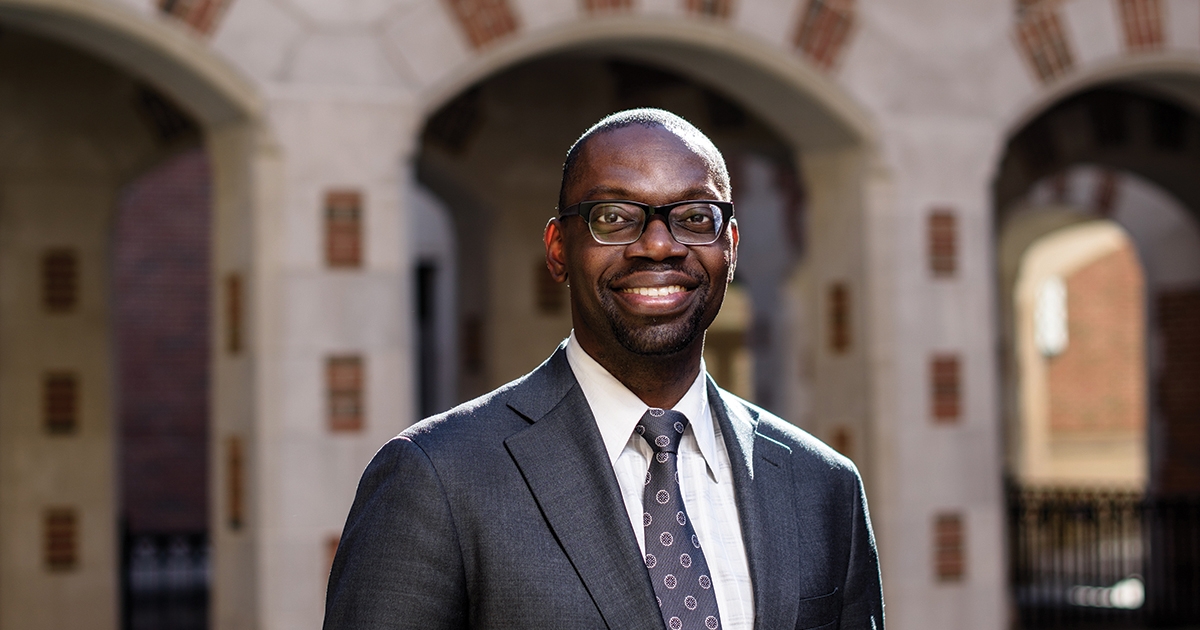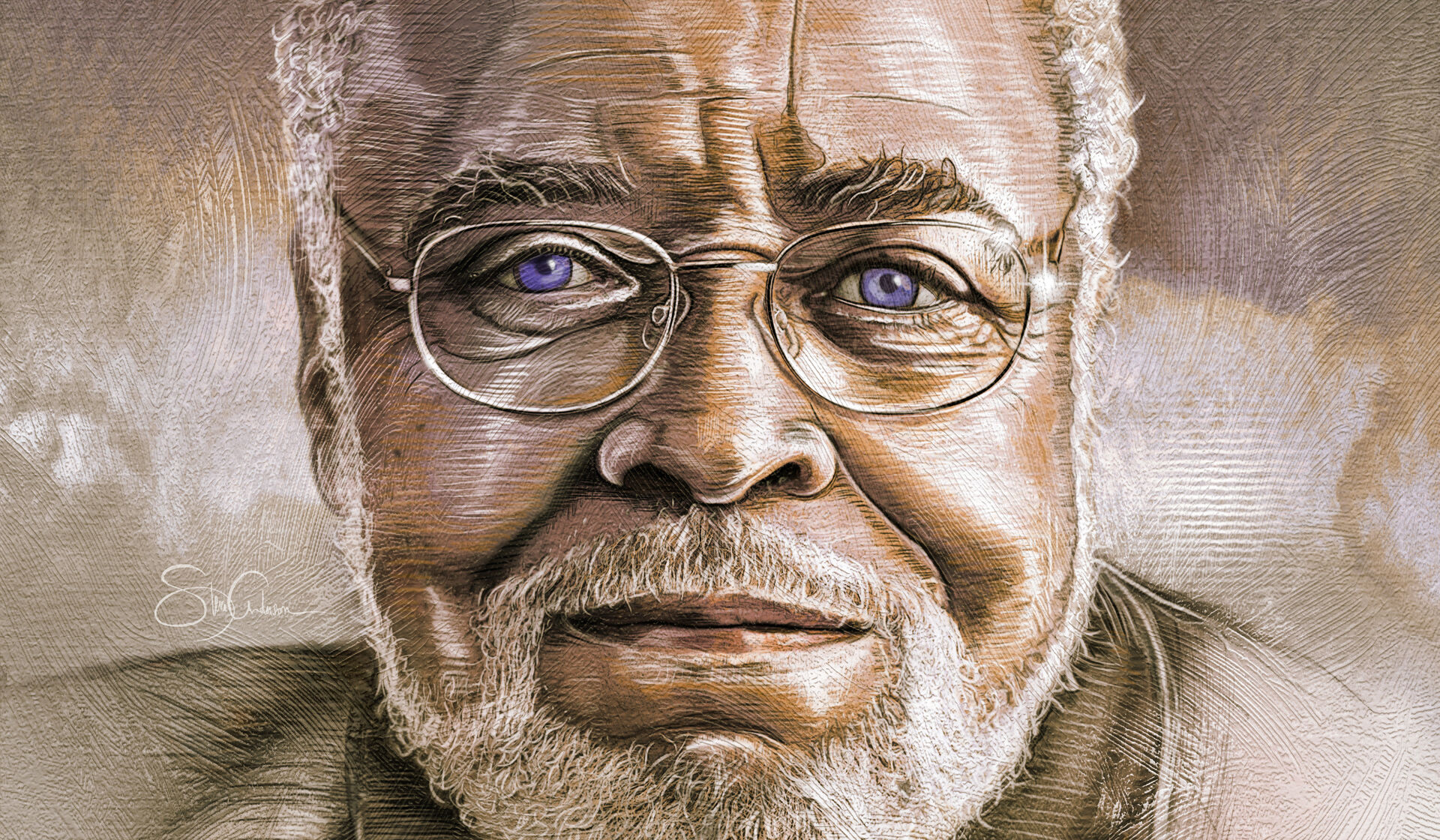When Garlin Gilchrist II, ’05, raised his hand on a frigid New Year’s Day to take the oath of office as Michigan’s 64th lieutenant governor, he did so with a certain confidence that made it clear he was gratified but undaunted by the historic—or surprise—nature of the moment.
Never mind that a decade ago he was a fresh-out-of-college software engineer at Microsoft. Or that four months before the inauguration he was ensconced not in the rough-and-tumble of politics but the intellectual haven of a research center at U-M’s School of Information. Never mind, too, that he’d never won any political office before but was now a heartbeat away from a governorship or that Michigan voters had never elected an African-American as lieutenant governor.
“Let us choose to leave no cry for help unheard, no call for empathy unanswered, and no opportunity for collaboration on the table,” he boomed in his inaugural address from the steps of the Michigan Capitol. His wife, Ellen, and 4-year-old twins were seated behind him along with a phalanx of former governors and current U.S. senators. “We are … lifted by the sweat of parents like mine who, as the first of their generation to go to college, sacrificed to make real the promise of a middle-class life that could position their only child for success.”
The 36-year-old native Detroiter is the first to admit his route to being tapped by Democratic gubernatorial nominee Gretchen Whitmer was unconventional. After all, he was just a few months removed from a loss at his only attempt to win public office—a race to unseat the incumbent Detroit clerk that ended in a defeat by less than 1 percent.
“My wife said, ‘The reason you ran for office in Detroit was because you felt like you had a skill set that prepared you to solve a particular set of problems.’ So the question became, ‘Well, statewide office?’ I’ve never thought about that before, but is it crazy?” Gilchrist recalled in a December interview in his transition office in the state capital of Lansing. “It could be an amazing opportunity.”
Gilchrist, whom Whitmer dubbed a “tech guru” in announcing his selection, is a rare politician because of his computer science background and long-standing efforts to use it to engage voters and improve the lives of minorities and the poor. One of his experiences at U-M that had the most impact, he said, was a 2003 research project called DetroitCONNECTED, in which he helped affix an antenna to Detroit’s Fisher Building to beam inexpensive internet access to a specific low-income neighborhood. Gilchrist and other students interviewed people taking advantage of the service, conversations that impressed upon him how valuable technology can be to lifting up disadvantaged people.
“Garlin struck me as a person who wasn’t a dabbler,” said U-M social work professor Larry Gant, who oversaw the DetroitCONNECTED project. “He was focused. He was looking for something. He was so unique—a young person of diverse background who hit the sweet spot where he cares about people, cares about the community, is into technology. It’s pretty rare to find someone who is not dabbling in all of those but has thought deeply about them.”
That started early. Gilchrist’s parents, who moved to the mostly white Detroit suburb of Farmington in the 1990s to access better public schools, were always on the lookout for African-American mentors. After his mother, an accountant at General Motors, befriended the black information technology guy in her office, she learned he also ran a computer-building business out of his living room. Young Gilchrist would work two days for him, and the first five computers he built became a computer lab for an urban community center. The teen also wrote a manual and conducted training sessions to teach people how to use the computers.
As a U-M engineering student, his activism took the form of efforts to carve out supportive spaces on campus for minority students. He restarted a networking group called the Black Electrical Engineers and Computer Scientists and became chair of a support group for black men called Here Earning a Destiny Through Honesty, Eagerness, and Determination of Self. He was already familiar with U-M when he arrived as a freshman, having spent most summers since seventh grade taking part in free, live-in science and engineering programs for Detroit-area students.
Gilchrist took a conventional path after graduation, moving to Washington state to write code for Microsoft. Corporate life was unfulfilling, though. So in 2008, as a side gig, he served as that state’s social media director for Barack Obama’s first presidential run. After that election, he moved to Washington, D.C., to work full-time for MoveOn.org.
Yet Gilchrist never stopped pining to return to Detroit and wishing better professional opportunities existed there, as evidenced by his founding of Detroit Diaspora, an online community of far-flung Detroiters still concerned about the city’s comeback.
“The whole time Garlin was away from Detroit, he was thinking not only about going back but organizing Detroit Diaspora to build something for the future,” said Ben Wikler, a senior adviser and former director for MoveOn.org. “Some people arrive in D.C. and kind of get stuck to it; they can’t imagine being anywhere else. That was never true of Garlin even when he was regularly attending meetings at the White House.”
In 2014, he was lured back by Detroit Mayor Mike Duggan, ’80, JD’83, who hired Gilchrist to head up a new initiative aimed at improving the city’s technological systems to better serve and engage the public. Then, in 2017, motivated by technology problems that created confusion and controversy at Detroit’s polling places during the 2016 election, Gilchrist quit to try to unseat the city’s longtime clerk. The campaign came up short, but his ability as a newcomer to mobilize and engage voters made many in Michigan’s Democratic circles take notice—including Whitmer.
Before that, however, Gilchrist was recruited to be the first executive director of the Center for Social Media Responsibility within U-M’s School of Information. The center is a think tank aimed at coordinating and publishing research on how tech companies like Facebook and Twitter can prevent “fake news” and anti-social behavior from proliferating. He was startled, he said, to find that there were significantly fewer black students on campus than in his day.
“I liked to hold open office hours in the League where I’d sit there and work and students would come up to me and talk about whatever,” Gilchrist said. “I thought it was important that they see a black staff member who wanted to help them feel like this is a place where they can be successful.”
That work was cut short by the Whitmer campaign. Gilchrist blitzed 22 counties and 100 cities campaigning for the ticket in the 10 weeks between his selection and their Election Day victory. Along the way, he was criticized for his lack of elective office experience; Whitmer retorted with a quip that she served 14 years in the legislature, which was “more than my past two predecessors combined.”
Gilchrist also drew some bad press in October when a blogger reported he and his wife had let an eight-unit apartment building bought through the city’s sale of foreclosed buildings become blighted. The couple spent a weekend cleaning it up to the city’s satisfaction, Whitmer gave him unwavering public support, and the matter had little discernible impact on the election’s outcome.
By December, he was busy getting ready for his unexpected new life, with administrative flow charts and lists of legislators adorning his desk. In Lansing, he hopes to find ways to help provide high-speed internet access to the 40 percent of Detroit homes and 50 percent of homes in Michigan’s Upper Peninsula that lack it. But he’s also clear that he’s there to support Whitmer’s agenda.
Gilchrist is not the youngest lieutenant governor, but it can be argued that he’s the most social media and tech savvy—as evidenced by his almost-daily Twitter videos. Perhaps the most important of those was the video he posted on Jan. 9 as he prepared to assume his constitutional role as president of the Michigan Senate.
“Later this morning, I’ll be gaveling in the 100th session of the Michigan Senate, and this will be the first session that is presided over by a black person from Michigan,” he said. “It is such a humbling honor to have that distinction, and I’m ready to step up and to stand tall for the people of the state of Michigan. … Let’s work together, let’s get it done, and let’s have fun making Michigan a better state.”
Steve Friess is a Michigan-based freelance journalist and former senior writer for POLITICO who covered the 2016 election in Michigan for The Washington Post.
Editor’s Note: This article originally referred to Garlin Gilchrist II as the first African-American elected to statewide office. He is the first African-American elected lieutenant governor.





